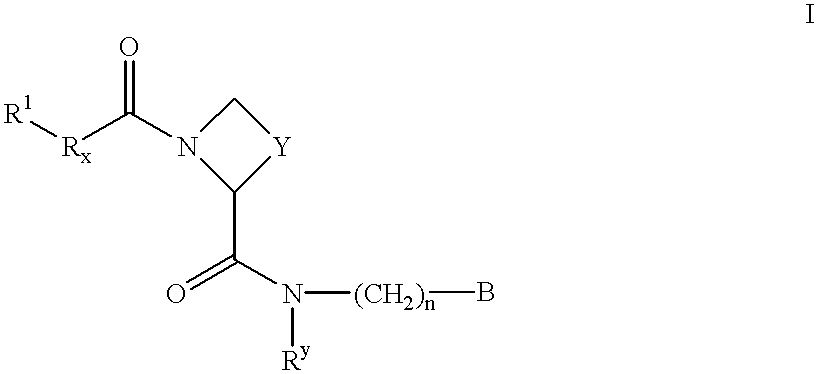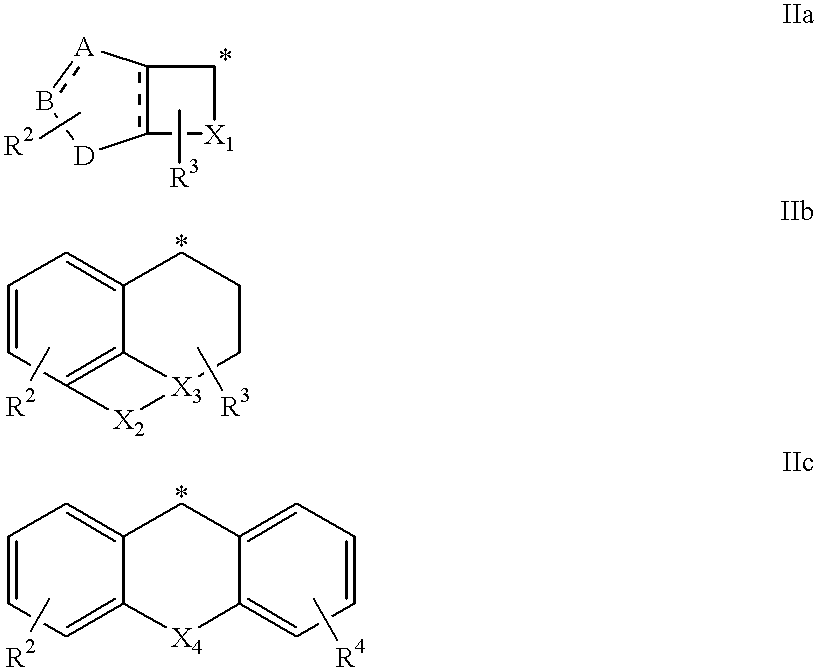Amidino derivatives and their use as thrombin inhibitors
a technology of amidino derivatives and inhibitors, which is applied in the direction of biocide, drug composition, extracellular fluid disorder, etc., can solve the problems of thromboembolic diseases, the need for protecting groups, and the need for negate or render necessary
- Summary
- Abstract
- Description
- Claims
- Application Information
AI Technical Summary
Benefits of technology
Problems solved by technology
Method used
Image
Examples
example 1
(S)- or (R)-1-Hydroxy-7-methoxytetralin-1-yl-C(O)-Pro-Pab
i) 1-Hydroxy-7-methoxytetralin-1-yl-carboxylic acid, methyl ester
The sub-title compound was prepared according to the method described by is C. F. Bigge et al (J. Med. Chem (1993) 36, 1977) using 7-methoxytetralone (1.0 g; 5.67 mmol) and methanol instead of ethanol. Yield: 1.22 g (90%).
.sup.1 H-NMR (300 MHz; CDCl.sub.3): .delta.7.05 (d, 1H), 6.80 (d, 1H), 6.65 (s, 1H), 3.80 (s, 3H), 3.75 (s, 3H), 2.85-2.65 (m, 2H), 2.25-1.90 (m, 4H)
(ii) 1-Hydroxy-7-methoxytetralin-1-yl-carboxylic acid 1-Hydroxy-7-methoxytetralin-1-yl-carboxylic acid, methyl ester (1.16 g; 4.9 mmol; from step (i) above) was dissolved in THF (10 mL) and lithium hydroxide (0.41 g; 9.8 mmol) was added to the resultant solution, followed by water (4 mL). The reaction mixture was stirred at room temperature for 3 h, the THF was evaporated, and the aqueous phase was washed with methylene chloride. The reaction mixture was acidified with HCl (2M) and then saturated wi...
example 2
(R)- or (S)-1-Hydroxy-7-methoxytetralin-1-yl-C(O)-Pro-Pab
The title compound was prepared according to the method described in Example 1(iv) above from (R)- or (S)-1-hydroxy-7-methoxytetralin-1-yl-C(O)-Pro-Pab(Z) (10 mg; 0.017 mmol; Compound 1B from Example 1(iii) above). Yield: 10 mg (98%; purity 80.4%).
LC-MS (m / z) 451 (M+1).sup.+
.sup.1 H-NMR (400 MHz; CD.sub.3 OD) .delta.7.78 (d, 2H), 7.63 (d, 2H), 7.04 (d, 1H), 6.78 (dd, 1H), 6.75 (d, 1H), 4.67-4.48 (m, 3H), 3.68 (s, 3H), 3.30-3.23 (m, 1H), 2.86-2.61 (m, 3H), 2.23-1.71 (m, 11H)
example 3
(S)- or (R)-1-Hydroxy-7-methoxytetralin-1-yl-C(O)-Aze-Pab.times.HOAc
(i) (S)- and (R)-1-Hydroxy-7-methoxytetralin-1-yl-C(O)-Aze-Pab(Z)
TBTU (0.584 g; 1.7 mmol), followed by DIPEA (0.200 g; 1.55 mmol) were added to an ice-cold solution of 1-hydroxy-7-methoxytetralin-1-yl-carboxylic acid (0.345 g; 1.55 mmol; see Example 1(ii) above) in DMF (10 mL). After stirring at 0.degree. C. for 15 minutes, H-Aze-Pab(Z).times.2HCl (0.750 g; 1.7 mmol; prepared according to the method described in International Patent Application WO 97 / 02284) and DIPEA (0.603 g; 4.65 mmol) were added and the mixture was stirred at RT for 4 days. The DMF was evaporated, and the resultant material was partitioned between water and EtOAc. The organic layer was separated, the water phase was extracted 3 times with EtOAc, and the combined organic layer was dried (Na.sub.2 SO.sub.4) and concentrated. The product, a white powder, was further purified using preparative RPLC (CH.sub.3 CN:0.1M ammonium acetate; 46:54) yielding ...
PUM
| Property | Measurement | Unit |
|---|---|---|
| Pharmaceutically acceptable | aaaaa | aaaaa |
Abstract
Description
Claims
Application Information
 Login to View More
Login to View More - R&D
- Intellectual Property
- Life Sciences
- Materials
- Tech Scout
- Unparalleled Data Quality
- Higher Quality Content
- 60% Fewer Hallucinations
Browse by: Latest US Patents, China's latest patents, Technical Efficacy Thesaurus, Application Domain, Technology Topic, Popular Technical Reports.
© 2025 PatSnap. All rights reserved.Legal|Privacy policy|Modern Slavery Act Transparency Statement|Sitemap|About US| Contact US: help@patsnap.com



